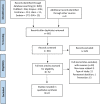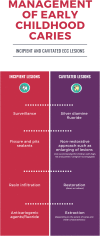Recommended procedures for the management of early childhood caries lesions - a scoping review by the Children Experiencing Dental Anxiety: Collaboration on Research and Education (CEDACORE)
- PMID: 32183770
- PMCID: PMC7079355
- DOI: 10.1186/s12903-020-01067-w
Recommended procedures for the management of early childhood caries lesions - a scoping review by the Children Experiencing Dental Anxiety: Collaboration on Research and Education (CEDACORE)
Abstract
Background: Early childhood caries (ECC) affects millions of children up to 6 years old. Its treatment positively impacts the quality of life of children and their families. However, there is no consensus on how to treat ECC. Thus, we performed a scoping review to identify the recommended procedures for the management of ECC lesions.
Methods: A search was performed in PubMed, Scopus, The Cochrane Library, The International Guideline Library and pediatric dentistry associations around the world were contacted by email for unpublished search documents. ECC guidelines/guidance/policies were considered eligible regardless of language and publication date.
Results: From a total of 828 references, 52 full-text articles were assessed for eligibility and 22 included in the scoping review. We found different procedures recommendations for the management of ECC lesions. For incipient lesions, minimally invasive methods such as professional fluoride and cariostatic (silver diamine) applications, as well as surveillance were recommended. If restoration was required, the recommended materials were glass ionomer cement, composite resin, amalgam and stainless-steel crown. Interim restorations and Atraumatic Restorative Treatment (ART) were also recommended. Extractions have been suggested for teeth with lesions with pulpal involvement, depending on the child's behaviour and other clinical conditions.
Conclusions: Non-operative procedures, restorative and extraction were recommended for the management of ECC, depending on the extent of the lesions. There is no difference between different management guidelines/guidance/policies for ECC lesions.
Keywords: Child, preschool; Dental care; Dental caries; Guideline.
Conflict of interest statement
The author Daniela Raggio is part of Editorial Board.
Figures
References
-
- Kassebaum NJ, Smith AGC, Bernabé E, Fleming TD, Reynolds AE, Vos T, et al. Global, regional, and national prevalence, incidence, and disability-adjusted life years for oral conditions for 195 countries, 1990-2015: a systematic analysis for the global burden of diseases, injuries, and risk factors. J Dent Res. 2017;96:380–387. doi: 10.1177/0022034517693566. - DOI - PMC - PubMed
Publication types
MeSH terms
Substances
LinkOut - more resources
Full Text Sources
Medical



